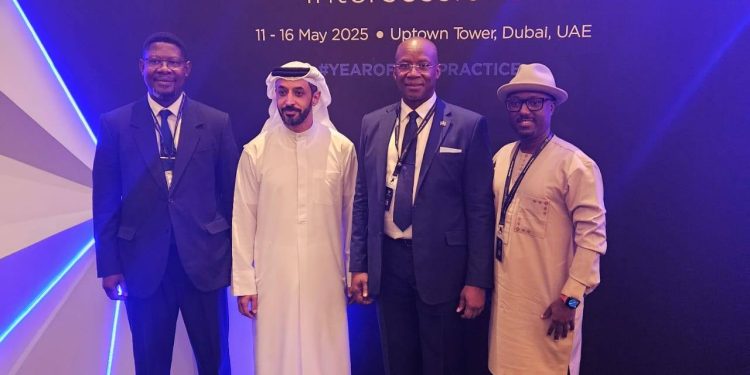On Sunday, 11 May 2025, the Minister of Mines and Mineral Resources of the Republic of Sierra Leone and Chairman of the Africa Diamond Producers Association (ADPA) safely arrived in Dubai, UAE, with the Sierra Leonean delegation – Nancy Tengbeh, Permanent Secretary, Ministry of Mines and Mineral Resources (MMMR); Dr. Kelvin Anderson, Deputy Director-General, National Minerals Agency (NMA);
Mohamed Bah, Director of Precious Minerals Trading (PMT), NMA; and Mohamed Salieu Bah, Manager of Audit and Trading (PMT), NMA – to participate in the Kimberly Process Certification Scheme (KPCS) Intersessional meeting (11-16 May 2025). Sierra Leone is a member of the KPCS’s Working Group on Monitoring (WGM), Working Group of Diamond Experts (WGDE), and the Working Group on Artisanal and Alluvial Production (WGAAP).
Later in the day, Minister Mattai successfully chaired the ADPA Pre-KPCS Intersessional Meeting at the SO\Uptown Tower in Dubai , where the following issues were deliberated upon: Definition of “Conflict Diamonds”; the ADPA letter to the KP; the Central African Republic (CAR) letter to the KPCS; and the KPCS vice-chairmanship for 2026.
In his open and closing statements at the ADPA Pre-meeting, Minister Mattai reminded all present that they are gathered in Dubai not merely as representatives of nations or organisations, but as custodians of a vision – one born from the collective determination to ensure that the diamond trade is a force for peace, prosperity, and ethical progress. He emphasized that the KPCS stands as a testament to what the world can achieve when unity, purpose, and integrity converge and that it is this same spirit that must guide the KPCS Intersessional meeting as they chart the course forward.
Minister Mattai pointed out that “in recent times, however, our unity has been tested by efforts to introduce broader geopolitical disputes such as the conflict between the Russian Federation and Ukraine into the KPCS agenda. While the gravity of such conflicts can not be understated, we must recognize that the Kimberley Process was not conceived as a forum for resolving international political crises. Its mandate, enshrined in United Nations resolutions and the Interlaken Declaration, is clear: to regulate the trade in rough diamonds and prevent their use in fueling rebel violence. “
Minister Mattai warned that rto burden the KPCS with issues beyond its scope risks undermining its credibility, diluting its effectiveness, and fracturing the very consensus that has made it the only demonstrable vehicle of collaborative efficacy in the global fight against conflict diamonds. He further stressed that “the recent attempts to politicize our KPCS agenda have already threatened the integrity of our deliberations, stalling progress and sowing division where unity is most needed.”
He ncouraged ADPA Members and Observers to reaffirm their unwavering commitment to the KPCS’s original vision and mandate and to exclude from the KPCS’s agenda discussions that fall outside its core responsibility, including the conflict between Russia and Ukraine, so that it may preserve the integrity, focus, and efficacy of the KPCS.
Minister Mattai also emphasized that his statement was not a call to ignore the suffering caused by conflicts elsewhere nor to diminish the importance of global peace. Rather, it is a call to honour the KPCS’s unique role – a role that has transformed the diamond industry and brought hope to millions. He concluded by encouraging ADPA to stay true to the KPCS’s mission and ensure that the KPCS remains a beacon of ethical trade, a model for international cooperation, and a shield for vulnerable communities.
He also added that ADPA should rise above division and distraction and protect the KPCS from the tides of politicization, so it may continue to serve as a pillar of peace, stability, and shared prosperity for all diamond-producing nations, especially those in Africa, whose futures are most intimately tied to the success of the KPCS.











